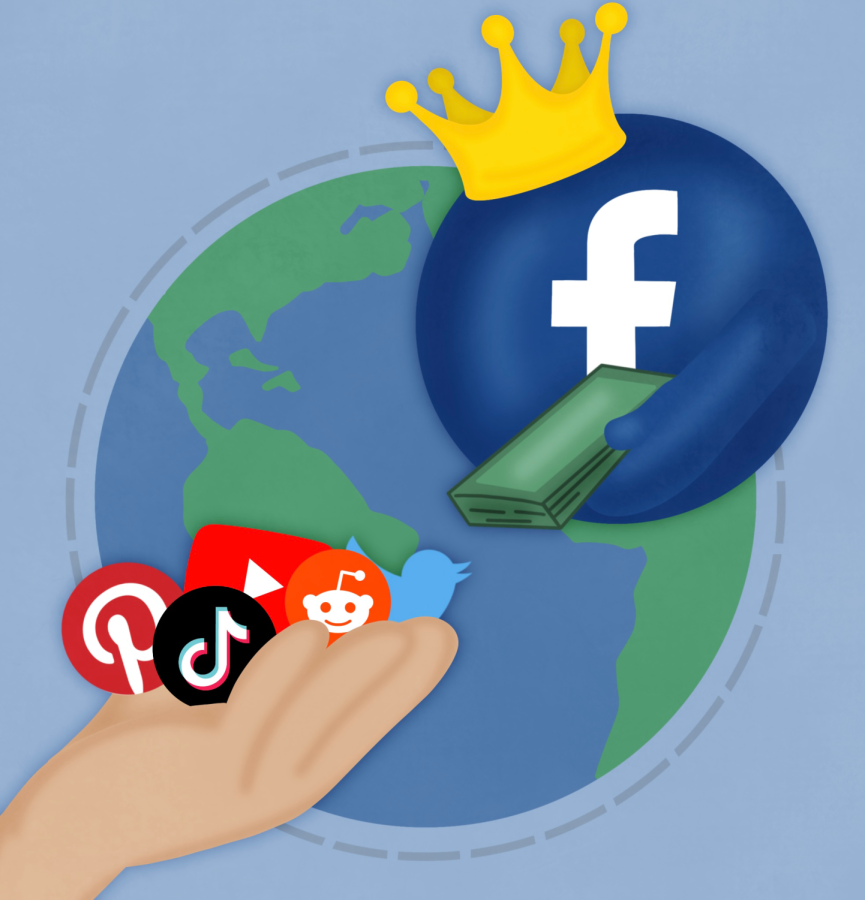Terms and conditions apply
October 19, 2021
On Monday, Oct. 4, Facebook’s servers, and subsequently everything that relies on those servers, were down for a total of about six hours. If you are one of Facebook’s 2.8 billion worldwide users, this certainly isn’t news to you. Facebook came forward amidst the outages to share that the issue was not a hack, but that it was actually self-inflicted; however, for a company with as much weight on its shoulders as Facebook, I’m not sure what’s worse.
According to National Public Radio, a routine update sent to Facebook’s network trafficking routers allegedly failed, sending a ripple of errors through Facebook’s servers, including its own internal systems capable of patching and rebooting the networks. Although technology outages have become a rather common occurrence in the digital age, last week’s crash revealed pressing flaws in Facebook’s server configuration.
Instagram and WhatsApp, purchased by Facebook in the early 2010s for $1 billion and $16 billion respectively, play vital roles in communication and commerce across the world. Hundreds of millions of companies use Instagram, WhatsApp, Facebook or a combination of the three as their primary means of conducting business, as the apps provide an advertising scaffold, customer relation network and physical marketplace all in one. Incidentally, when Facebook crashed, it took Instagram and WhatsApp down with it. The outage spanned nearly six hours — right smack in the middle of the working day. As a result, small businesses on Facebook reported respective losses ranging from a couple hundred to several thousand dollars. Albeit, this number is small in comparison to the losses of Facebook CEO Mark Zuckerberg himself, who is now unfortunately only the world’s sixth-richest person.
Social networking is a fundamental part of life in the 21st century, as it permits both intrapersonal and interpersonal communication and provides a platform for personal, group and mass communication. Social networking sites like Instagram, Facebook, Snapchat and Twitter promote local and e-commerce and allow companies to interact with their customer base on a more personal level. These sites also provide widespread access to news, journalism and art, and have proven extremely effective at bringing social justice issues to light. However, in all of its glory, social media has a dark side. We were all lectured about internet safety growing up, but maybe it isn’t the ‘strangers’ on the internet we should be wary of.
The monopolization of social networking sites could be detrimental to the future of online communication infrastructure. Like in any other market, competition is crucial to the rapidly evolving digital world. Without it, social networking sites begin to overlap and the quality of the service diminishes, leaving users with less choices and more vulnerable to security and privacy threats. Competition encourages innovation, keeps prices reasonable and provides incentives for customer satisfaction. In other words, it ensures that the market is controlled by its consumers.
Social media has integrated itself into our everyday lives, and therefore is able to collect sensitive information about the behavioral patterns of each user and their social circle. The more interconnected our networks, the more information is available for analysis. This material can be extremely powerful, as it can be used to predict behavior both on and offline, and can be fed into marketing or even propaganda techniques. Curious as to what Facebook knows about you? Go to ‘Settings & Privacy’ of the settings menu, and find the subsection called ‘permissions’ — here, you can find some of the data that Facebook has collected from your searches, location history, ad engagement and use of other websites or applications. Whether this information is purely used for marketing purposes or not, it’s quite creepy. Maybe it’s time to start reading those terms and conditions?
Online social networking has become the backbone of communication in the 21st century. If the monopoly that Facebook holds over the social networking market persists, consumers will inevitably lose the autonomy that they hold over the digital market. After all, if you don’t control the market, it will control you!












